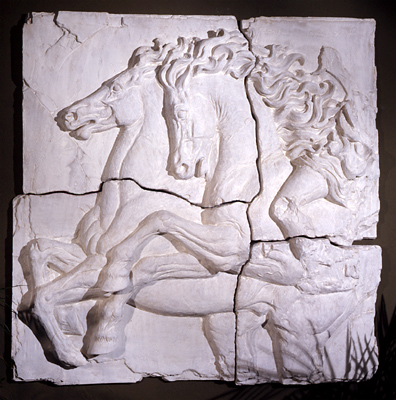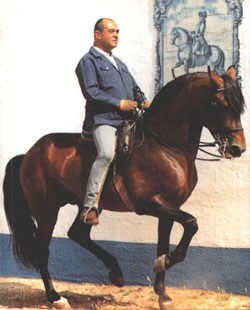
The Opportunist
Opportunist: A person who adapts his actions, responses, etc., to take advantage of opportunities, circumstances, etc. Any who seek to profit from the prevailing circumstances.
Opportunism is not limited to interactions with other people. It’s an approach I find extremely useful when handling horses. My intention is not to take advantage of the horse, at the horse’s expense. My intention is to be watchful; attentive enough to the horse to recognize when might be a good time to make a suggestion to him. This might be a moment when his weight is distributed just right, that asking for the motion that goes with that position might be a perfectly logical and a crystal clear request. This is an ideal learning moment for the horse, when he can make the connection between *this* aid and *this* body position. With such precise timing of the aids, the horse is able to understand our requests very clearly. With consistent presentation of precise aids at the correct time, a horse is able to quickly learn the aids and give us a consistently accurate performance.
But good timing is not limited to the rider presenting the aids concurrently with the appropriate physical positioning of the horse’s body. There is also the matter of presenting the aids at the appropriate time to take advantage of the emotional mood or mental state of the horse. When considering his emotional state, you may ask yourself, “Is he feeling irritable, bored, distracted; or engaged, affectionate, cheerful?” There is no advantage in picking a fight with a horse who is already in a poor mood. These horses need to be emotionally warmed up before anything productive can happen. Maybe that means extra scratches in a favorite spot, or just hanging out quietly on the end of a lead rope, under a tree, grazing quietly. If one wishes for highly animated movements, a higher emotional-yet controlled-state is needed. A lower level of emotional excitement, or energy, is ideal for quieter, softer movements. The horse’s personality will dictate the best means for engaging his emotions in a productive way. When considering his mental state, you may ask yourself, “Is he feeling curious, or bored? Is he mentally aroused and engaged, or tuned out, distracted?” One cannot teach a student whose mental attention is focused elsewhere. He cannot learn what he has not heard. Managing the horse’s mental state and attention is a necessary faucet of teaching.
Opportunism is not limited to interactions with other people. It’s an approach I find extremely useful when handling horses. My intention is not to take advantage of the horse, at the horse’s expense. My intention is to be watchful; attentive enough to the horse to recognize when might be a good time to make a suggestion to him. This might be a moment when his weight is distributed just right, that asking for the motion that goes with that position might be a perfectly logical and a crystal clear request. This is an ideal learning moment for the horse, when he can make the connection between *this* aid and *this* body position. With such precise timing of the aids, the horse is able to understand our requests very clearly. With consistent presentation of precise aids at the correct time, a horse is able to quickly learn the aids and give us a consistently accurate performance.
But good timing is not limited to the rider presenting the aids concurrently with the appropriate physical positioning of the horse’s body. There is also the matter of presenting the aids at the appropriate time to take advantage of the emotional mood or mental state of the horse. When considering his emotional state, you may ask yourself, “Is he feeling irritable, bored, distracted; or engaged, affectionate, cheerful?” There is no advantage in picking a fight with a horse who is already in a poor mood. These horses need to be emotionally warmed up before anything productive can happen. Maybe that means extra scratches in a favorite spot, or just hanging out quietly on the end of a lead rope, under a tree, grazing quietly. If one wishes for highly animated movements, a higher emotional-yet controlled-state is needed. A lower level of emotional excitement, or energy, is ideal for quieter, softer movements. The horse’s personality will dictate the best means for engaging his emotions in a productive way. When considering his mental state, you may ask yourself, “Is he feeling curious, or bored? Is he mentally aroused and engaged, or tuned out, distracted?” One cannot teach a student whose mental attention is focused elsewhere. He cannot learn what he has not heard. Managing the horse’s mental state and attention is a necessary faucet of teaching.

“His system is that he was able to understand and accept that each horse will need something different, different types of training at times, and he was able to stay fluid throughout the whole training of the horse. He went from only training Iberic horses in an Iberic manner to a completely different way of thinking about horses. All he would say to me was, "pick the right moment and do what has to be done to break the contractions.” I think that it is the philosophy of fluidity…the fluidity of his classical training, following the horse's requirements with the training, that I understood. I can't do it all the time but I understand it and appreciate that. He was starving for someone who appreciated that.” Bettina Drummond on Nuno Oliveira
There is a defining difference, between artists and competitors. Artists have a vision for their horse, for their riding, for the community of horses and riders to which they belong. Competitors have goals for themselves. Certainly, there are artistic competitors, and competitive artists. Each are seeking the fulfillment of goals, through the effective recognition and use of opportunities, but in their truest forms, artists are seeking something beyond themselves, bigger than themselves, setting goals which lift the entire community up. Competitors will stand upon others to make themselves appear taller. How do you wish to use the opportunities you have been presented with?
I am an opportunist and I retain no shame about this. I wonder, at what point did being an opportunist become a bad thing? It seems when the label is used, it suggests someone is unethical, and has committed some offensive action which benefits the opportunist, at the expense of someone else. Not all opportunists consider that a reasonable option. Certainly, I wish to take action, when I see an opportunity for self-growth or fulfillment…and the more people, or horses, I can advance with me, the more fortunate that opportunity is. Grasping at an opportunity which benefits only myself is hardly worth the effort. The educated equestrian understands embracing the “inner opportunist” will make them a better horseman or woman. It has nothing to do with the exploitation of others, but of watchful anticipation of useful moments which can be utilized for the benefit of all those involved. Tricky thing is, moments are just what such opportunities are--quick, fleeting moments in time. The world is not a static place, and none of us are static beings. Opportunities come and go, and we will certainly miss many of them, but don’t be discouraged by the missed ones. Another opportunity will present itself soon.
I am an opportunist and I retain no shame about this. I wonder, at what point did being an opportunist become a bad thing? It seems when the label is used, it suggests someone is unethical, and has committed some offensive action which benefits the opportunist, at the expense of someone else. Not all opportunists consider that a reasonable option. Certainly, I wish to take action, when I see an opportunity for self-growth or fulfillment…and the more people, or horses, I can advance with me, the more fortunate that opportunity is. Grasping at an opportunity which benefits only myself is hardly worth the effort. The educated equestrian understands embracing the “inner opportunist” will make them a better horseman or woman. It has nothing to do with the exploitation of others, but of watchful anticipation of useful moments which can be utilized for the benefit of all those involved. Tricky thing is, moments are just what such opportunities are--quick, fleeting moments in time. The world is not a static place, and none of us are static beings. Opportunities come and go, and we will certainly miss many of them, but don’t be discouraged by the missed ones. Another opportunity will present itself soon.
4.13.12 TME
Return to Educated Equestrian
Return to Educated Equestrian